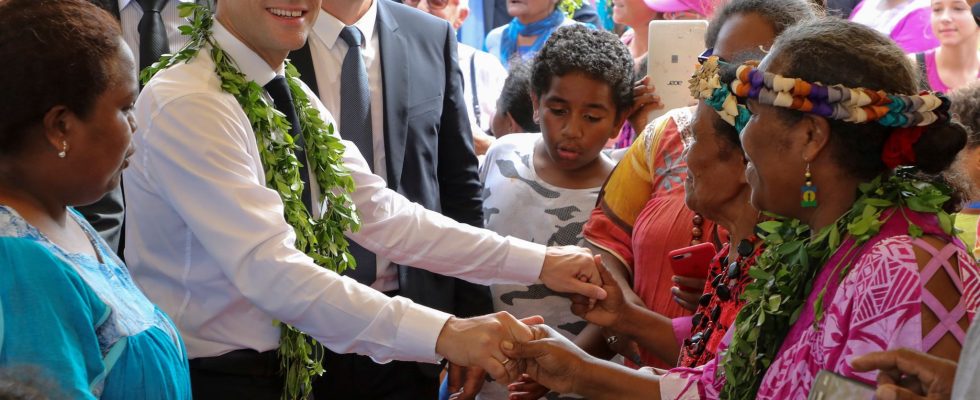In May 2018, Emmanuel Macron ended his first visit to the archipelago by declaring that “France would be less beautiful without New Caledonia”, when the first of three referendums for the independence of the island was to be held a few months later. Five years and three “no” later, the situation is far from being appeased on the “Caillou”, while the President of the Republic arrived this Monday, July 24 in Nouméa for a two-day visit, during which he will respond to the 1 p.m. news from France 2 and TF1.
Since the third and last self-determination referendum, organized in December 2021, New Caledonia has been in limbo. The “no” to independence had won a third victory, the most overwhelming of all, winning nearly 96.5% of the votes cast (compared to 56.7% in 2018 and 53.2% in 2020). But the massive boycott of the independence camp, which had called for a postponement of the ballot due to the Covid-19 epidemic, weighed in on this high result, which they are still contesting.
Open “a new page”
The Elysée ensures it: Emmanuel Macron’s visit must be part of a process of “gathering” between separatists and loyalists, the latter being in favor of maintaining the island in the French Republic. Upon his arrival in Noumea, the head of state thus claimed to have come to open “a new page”. Because if in the program of the president are well registered trips on youth or the environment, it is especially the day of Wednesday July 26, “more political”, which is eagerly awaited. On the menu: a meeting of loyalist and separatist camps.
Because if the self-determination of New Caledonia is for the time being abandoned, it is now a question of writing the future status of the island to take over from the Nouméa agreements. Signed in 1998, they had transferred many powers from the State to local institutions. It was also these agreements that instituted the organization of the three referendums for the island’s independence. But they had not really acted on what to do if the no to self-determination were to win, except that “the partners meet to study the situation thus created”.
However, since 2021, negotiations have been slowing down. The first post-referendum discussions took place in October 2022, in Paris. Organized by Gérald Darmanin, who in the meantime became Minister for Overseas France, they had however been boycotted by the independence camp, to protest against the holding of the third independence referendum. In April 2023, a new round of negotiations was held in the capital. This time, loyalists and separatists made the trip, without sitting at the same table. The sign that a possible agreement still seems far away.
Battle around the electorate
One point remains at the heart of the blockages: the question of the Caledonian electorate, frozen since 2009 and favorable to the Kanak separatist population. The latter want a status quo while the loyalists, logically, ask for the thaw. Both sides are aware that the delimitation of the electorate could strongly influence the results of the next provincial elections of 2024, essential for the conditions of the degree of autonomy included in the future statutes of New Caledonia.
Last June, Gérald Darmanin, omnipresent on the New Caledonian subject – to the detriment of his former minister, Jean-Philippe Carenco, landed during the last reshuffle for the benefit of Philippe Vigier -, succeeded in obtaining from the separatists an agreement in principle for a partial thaw of the electoral body. A first step taken in the direction of a possible agreement for the continuation of the island, but that the FLNKS assumes for the moment only half-word.
A first agreement expected before the end of the summer
In this context, Emmanuel Macron’s visit also aims to speed things up. Because time is running out: a reform of the Caledonian electorate must necessarily go through a reform of the Constitution, scheduled for early 2024. Without an agreement between separatists and loyalists by then, it is difficult to imagine the government going through in force on this subject. Not to mention that the majority of three-fifths of Parliament, necessary for a constitutional reform, is far from certain. This is also why Prime Minister Élisabeth Borne again invited separatists and loyalists to Paris at the end of August for trilateral negotiations, in the hope of reaching a first agreement at the end of the summer.
Following this sensitive trip, Emmanuel Macron will also travel to Vanuatu on July 27 and to Papua New Guinea on July 28, in order to show France’s commitment to the Pacific. Long considered, a trip by the Head of State to Wallis-and-Futuna, another French overseas territory in the Pacific, was finally canceled. “Logistical constraints”, advances the Elysée, while other voices invoke the strike movement of teachers for an alignment of their salaries with their colleagues in France, which could have given rise to demonstrations.
